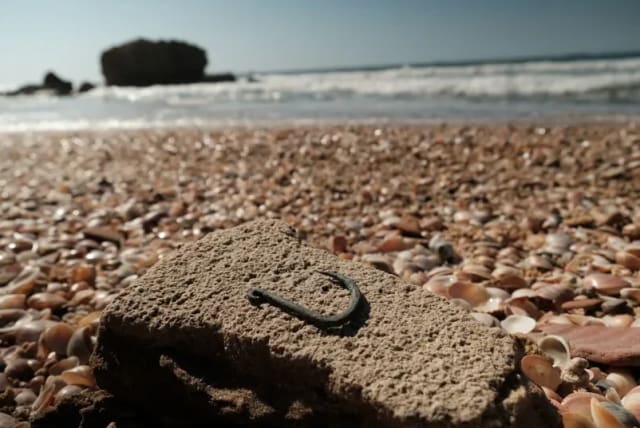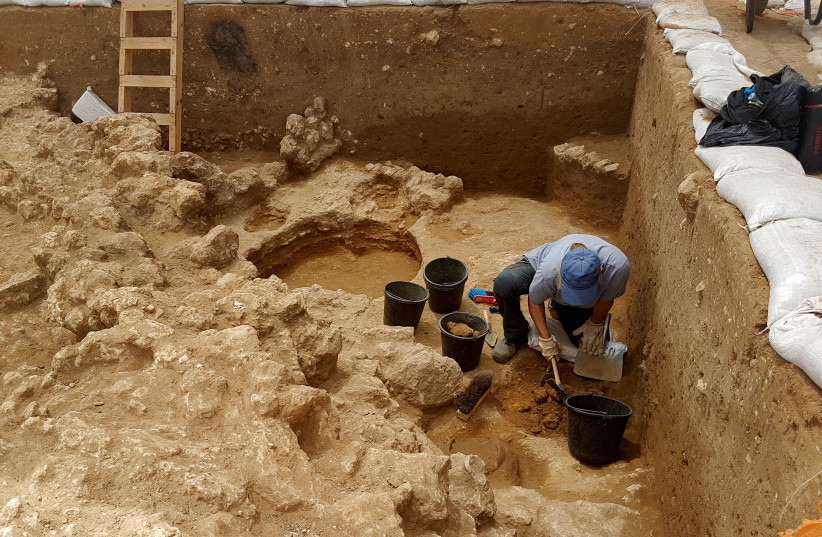6,000-year-old copper fishing hook discovered in Ashkelon

The hook measures 6.5 cm long and 4 cm wide and is one of the oldest to ever be discovered.
A 6,000-year-old copper fishing hook, possibly used for catching sharks or other large fish, has been discovered during an Israel Antiquities Authority excavation in Ashkelon, they announced on Wednesday morning.
The fishing hook - one of the oldest ones to ever be discovered - was uncovered prior to the construction of a new neighborhood in Ashkelon back in 2018, and will now be exhibited for the first time this April at the 48th Archaeological Congress, organized by the Israel Antiquities Authority, the Israel Exploration Society and the Israeli Archaeological Association.
The hook measures 6.5 cm long and 4 cm wide, and according to the co-director of the excavation Dr. Yael Abadi-Reiss, this makes it suitable for hunting sharks as long as two or three meters, or large tuna fish.
Early use of copper in fishhooks on the Mediterranean coast
"More ancient fishhooks found previously were made of bone and were much smaller than this one. The use of copper began in the Chalcolithic period and it is fascinating to discover that this technological innovation was applied in antiquity for the production of fishhooks for fishermen along the Mediterranean coast," she added.
The Chalcolithic period refers to the period of time between 2500 BCE-2200 BCE, during which the first simple tools made of copper and gold appeared.
During this era, large villages were established around Ashkelon, whose economy was based on the pasturing of sheep, goats and cattle, the cultivation of wheat, barley and legumes, and the tending of fruit orchards - all industries that are still alive and thriving to this day.
“We learn about the dietary habits of the people who lived here 6,000 years ago from the remains of animal bones found in ancient rubbish pits, from burnt wheat grains found in ovens, and from the hunting, cooking and food-processing tools retrieved, including flint sickles, and a variety of pottery vessels that served for the storage, cooking and the conservation of food by fermentation and salting," Abadi-Reiss explains.
"The rare fishhook tells the story of the village fishermen who sailed out to sea in their boats and cast the newly invented copper fishhook into the water, hoping to add coastal sharks to the menu."
Further research on the copper fishhook is being undertaken by Dr. Yotam Asscher of the Israel Antiquities Authority and Magda Batiashvilli, and scholars are hoping that the array of advanced technologies that are available for use could open up a new world of questions that could not previously be answered.
Jerusalem Post Store
`; document.getElementById("linkPremium").innerHTML = cont; var divWithLink = document.getElementById("premium-link"); if (divWithLink !== null && divWithLink !== 'undefined') { divWithLink.style.border = "solid 1px #cb0f3e"; divWithLink.style.textAlign = "center"; divWithLink.style.marginBottom = "15px"; divWithLink.style.marginTop = "15px"; divWithLink.style.width = "100%"; divWithLink.style.backgroundColor = "#122952"; divWithLink.style.color = "#ffffff"; divWithLink.style.lineHeight = "1.5"; } } (function (v, i) { });

